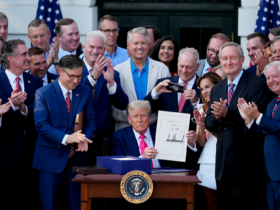There are numerous international organizations today that aim to integrate, facilita trade and generally bring together countries throughout the Ibero-American region. The most promising among them for a long time was the Organization of American States (the OAS). However, this organization has proven unable to resolve some of the critical conflicts in the region and has repeatedly shown a preference for Anglo-Saxon interests (such as during the Falklands War in 1982). There are, however, several new ibero-american organizations trying to accomplish this goal, including CELAC, UNASUR and recently PROSUR.
Founded in 2010, the CELAC (Community of Latin American and Caribbean States) is an intergovernmental mechanism made up of 33 Latin American countries, three of which are members of the G20 (Argentina, Brazil and Mexico)– this body effectively represents about 622 million inhabitants of more than 20 million square kilometers.
The organization aims to promote regional integration and individual development of member countries, something that recalls the days when these territories were still part of Spain. Although the organization excludes the United States and Canada, it bears mention that it is not a homogeneously Ibero-American community since some member countries still have Queen Elizabeth II of the United Kingdom as their “head of State” (such as Belize, Barbados, Bahamas, Grenada, Jamaica, Saint Kitts and Nevis, Saint Vincent and the Grenadines and Saint Lucia), which leaves a lot to be desired in terms of seriously working toward integration.
CELAC had an eventful first few years, managing to revive various forums and contacts that brought the people of Latin American together. The group hopes to eliminate the US’ “guardianship” over the region and promote greater political, economic and strategic autonomy. The organization has formed a series of extra-regional associations including CELAC-European Union, CELAC-China and others such as India, Russia, Japan and Turkey in order to help realize this goal.
Everything was going relatively well despite the ideological diversity of the governments that made up the diverse group… but this changed dramatically with the intensification of the social and political conflict in Venezuela, alongside various regime change political conflict in South America and destabilization fueled by foreign powers. These issues eventually led to CELAC canceling the last few meetings that had been planned in El Salvador and Bolivia. There are two major competitors involved: the “Lima Group” and the “ALBA” group. The “Lima Group” (which also includes Canada) does not recognize the Maduro government and supports the OAS’ decisions on the matter, while the ALBA group has consistently supported Venezuela and Nicaragua.
#Bolivia announces entry into Lima Group to resolve Venezuelan crisis https://t.co/wNX4K1Xpi7 pic.twitter.com/ETBm5QnBeg
— Reuters Venezuela (@ReutersVzla) December 23, 2019
This division has already destroyed the former continuity that CELAC had created, but now the situation has gone even further, threatening the future of the organization altogether. For the moment, Mexico, host of the next CELAC meeting, is trying to build bridges and resolve disputes between the two opposing sides, hoping to prevent the region from ending up divided, weakened and easy prey for malicious external actors.
In a previous article (DIVIDE AND CONQUER THE CASE OF IBERO-AMERICA PART 2), we discussed UNASUR (the Union of South American Nations) and how the politicization of “Socialism of the 21st Century” promoted by leftist governments had delegitimized the organization causing several members to renounce their membership.
A raíz del veto del término "violencia obstétrica" por parte del Ministerio de Salud Brasil, desde @isagsunasur compartimos un reciente artículo de #SaludAlSur en el cuál @raquelcerq00 repasa la violencia institucional contra las mujeres en Suramérica https://t.co/WhQbygviFe pic.twitter.com/HnLKkS4UOb
— ISAGS-UNASUR (@isagsunasur) May 8, 2019
In 2019, PROSUR (the Forum for the Progress of South America) was created by the United States ’closest allies, Iván Duque (Colombia) and Sebastián Piñera (Chile). PROSUR’s objective is to weaken UNASUR and replace it as the organization fostering ibero-american integration. However, PROSUR has the same problem that UNASUR did: it functions entirely based on ideology and serves to promote the agenda of a few governments, ultimately preventing it from creating a strategic block that goes beyond ideologies.
New multilateral body #Prosur has been created in #Chile. Despite what its enthusiasts claim, the new bloc is highly ideologically oriented—to the right.https://t.co/8jFoGy1OO2
— The Brazilian Report (@BrazilianReport) March 23, 2019
PROSUR is only supported by right-wing governments in South America such as Argentina (although this seems poised to change after the recent elections), Brazil, Chile, Colombia, Ecuador, Paraguay and Peru. The organization was designed to help politically isolate Venezuela and the symbolic weight it had in UNASUR. The rivalry between Venezuela and Colombia (countries closely linked to external-geopolitical players) is a serious obstacle to regional integration. Venezuela’s economic and strategic ties to Russia are well known, as are its connections with China, while Colombia has historic ties to the United States and recently became the first South American member of NATO.
These groups are too poisoned by ideology to ever realize their initial goal of fomenting ibero-american integration. The ongoing battle between liberalism and Marxism is the real obstacle to forming a real regional block. It is truly surprising to observe how neighboring states with the same origin, language and culture are unable to realize their common destiny because of these ideological diversions, which primarily seem to benefit those interfering from abroad.

















Leave a Reply